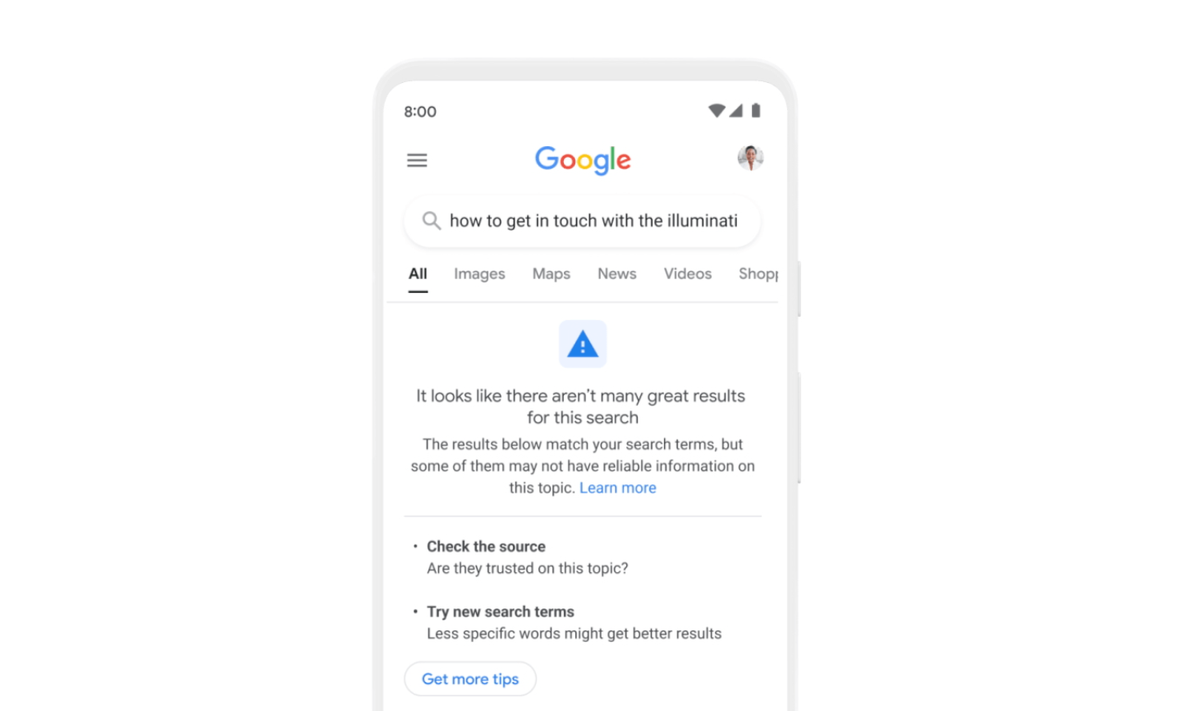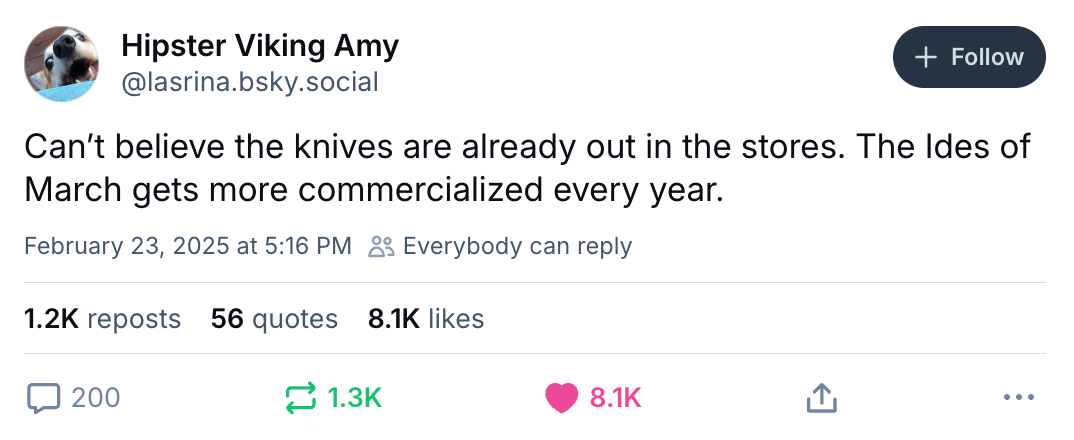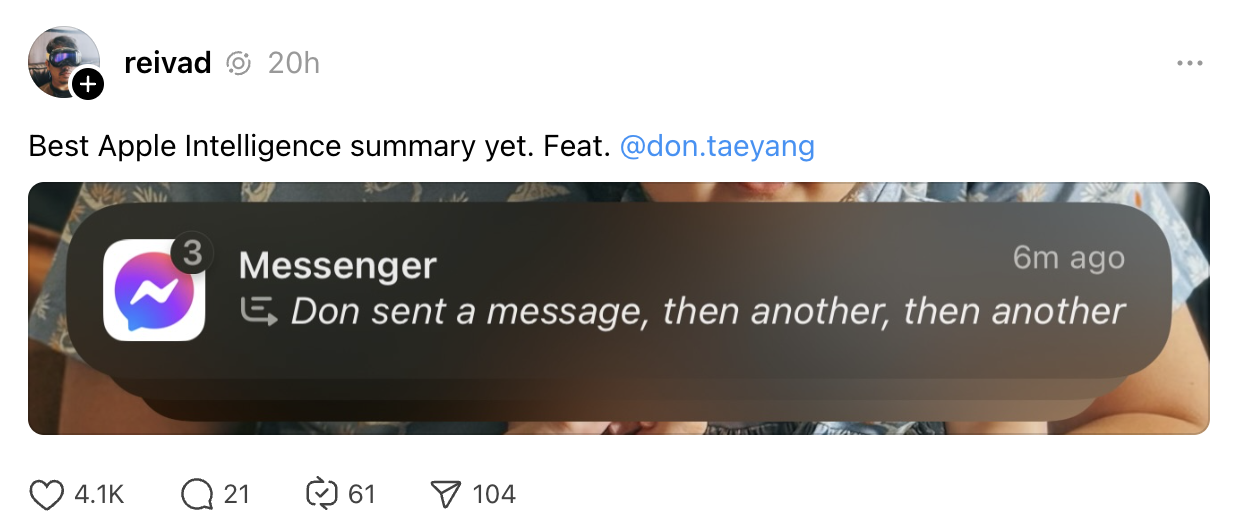Google gives up on data voids
The company once warned users when they might be seeing low-quality results — but weeks before the 2024 election, the feature was quietly turned off

Google quietly stopped showing warning banners that alerted users to potentially unreliable search results in the weeks leading up to the 2024 US presidential election, despite no obvious improvement in the quality of those results, according to a new study from researchers at Stanford and Carnegie Mellon University.
The study, led by Ronald E. Robertson of Stanford and Evan Williams of Carnegie Mellon, analyzed 1.4 million search queries shared on social media from October 2023 to September 2024. The study focused on “search directives” — social media posts encouraging people to search for specific terms, a practice often used by people who are spreading conspiracy theories. By encouraging people to “do their own research,” and then directing them to obscure results for which there are few high-quality links, they can trade on the trust that people have in Google to spread misinformation.
Beginning in 2022, Google began to show warning banners for some searches like this, which information researchers call “data voids.” Data voids are often exploited by actors seeking to spread misinformation on topics where little authoritative information is available.
In the early 2020s, as part of an industrywide effort to add context to potentially wrong or harmful information, Google added banners about three kinds of data voids: one where search results were of low relevance; one in cases where results are rapidly changing, such as after a natural disaster; and one — which researchers found that Google no longer displays — where the results are of low quality.
“It looks like there aren’t many great results for this search,” the banner for low quality results read. “The results below match your search terms, but some of them may not have reliable information on this topic.” The banner invited users to “check the source,” asking whether it is trustworthy.
The banners were shown relatively rarely: in about 1.5 percent of queries in the researchers’ March 2024 sample, the last before Google stopped showing the warnings. But when they were displayed, the banners often pointed out that results pointed to low-quality domains and conspiracy theories.
The study also found that conspiracy peddlers could ensure that no banners were displayed by including a site operator in the URL in the links they share. Site operators (such as “site:platformer.news”) direct Google to only search one specific domain. Google likely did not trigger warnings on such searches because it assumes anyone sophisticated enough to use a site operator knows what they’re doing. But the researchers’ work highlights how this eventually became an abuse vector for sharing conspiracies on social media, allowing conspiracy peddlers to launder fictional content related to QAnon, vaccines, and mythical lizard parasites through Google’s reputation.
The researchers collected their first data in October 2023 and March 2024. Initially, they were struck by how inconsistently Google showed its warnings. A deep learning model they built to analyze the queries suggested that the warnings should have appeared between 29 and 58 times as often as they did in practice. For motivated conspiracy peddlers, they were easy to evade: just adding quotation marks or a single letter to a query was typically enough to make the banner disappear.
The researchers were beginning to collect additional data last September when they discovered something unexpected: Google had stopped showing low-quality banners entirely, weeks before early voting began, without disclosing it.
Moreover, they wrote, the quality of results for the searches in their sample had not meaningfully improved.
“We found little evidence of substantive changes to the domain quality of the [search engine result pages] produced for queries that had previously received a low-quality banner,” they write. “Instead, we found that many of those queries continued to return low-quality domains in September 2024, they just no longer received a low-quality warning banner.”
The move was surprising, they wrote, given that elections so often generate conspiracy theories for which few high-quality results are available, or in which motivated actors quickly post pages filled with misinformation to support their political goals.
“Discontinuing these warning banners, without replacement or substantial improvements in domain quality, would be a surprising change to make in the months preceding the 2024 US elections,” the researchers write. “While we do not measure the impact of that change in this study, events with breaking news updates provide fertile grounds for data voids..”
The researchers called for "greater transparency around Google's warning banners, their prevalence, and the effects that their presence or absence has on real users."
Google confirmed to Platformer that it had discontinued the banners after finding that unspecified improvements to its core search engine had caused the warnings to trigger less often.
“As the result of a ranking quality improvement last year, the specific notice mentioned in this paper was not meeting our thresholds for helpfulness — it was surfacing extremely infrequently and was triggering false positives at a high rate, so we turned it down,” a spokesman said in an email.
I asked Google if it could share what “improvements” had resulted in the warnings appearing less often. (It’s not clear to me that this is a “ranking” problem, exactly — by definition, data voids have very few results.) The company declined to do so.
The company also said that the queries studied by researchers represent a tiny fraction of searches and are not representative of how most people use Google.
As an alternative to the banners, the company suggested that people use the “about this result” feature on the search engine results page, which uses information from Wikipedia to highlight websites known for spreading conspiracy theories. (Click or tap the three vertical dots next to the URL to find it.)
I asked danah boyd, a co-author of the original 2019 report about data voids, what she made of Google’s retreat.
“The whole point of “data voids” is that these are parts of the search query spaces where there is simply too little meaningful content to return without scraping the bottom of the barrel,” she told me.
boyd noted that not all data voids are dangerous. But it’s important that platforms continue to take it seriously, she said.
“As with all security issues, there is no magical ‘fix’ — there is only a constantly evolving battle between a system’s owners and its adversaries,” boyd said. “So if Google is getting rid of some of its tools to combat this security issue, is the company effectively saying ‘game on’ to any and all manipulators? That seems like a bad strategy.”

Governing
- Trump has fired at least 130 employees of the Cybersecurity and Infrastructure Security Agency, “included CISA staff dedicated to securing U.S. elections, and fighting misinformation and foreign influence operations.” (Brian Krebs / Krebs on Security)
- DOGE is planning to use an AI to evaluate federal employees’ responses to an email asking them what they did last week. (Courtney Kube, Julie Tsirkin, Yamiche Alcindor, Laura Strickler and Dareh Gregorian / NBC)
- Online education company Chegg sued Google, saying the company’s AI summaries were largely responsible for a 24 percent decline in its revenue. (Jordan Novet and Jennifer Elias / CNBC)
- OpenAI found evidence that Meta’s Llama model had been used by the Chinese government to create an AI system to find anti-China posts on social media. Looking forward to the session about this one at LlamaCon. (Cade Metz / New York Times)
- Elon Musk’s Grok was instructed not to cite any sources that were found stating that either Musk or Donald Trump spread misinformation. This is roughly the equivalent of finding out that ChatGPT had been instructed not to criticize Sam Altman, except (unlike had that been the case) it will be completely forgotten by tomorrow.
- Grok usage is still up after its 3.0 release last week, though. (Kyle Wiggers / TechCrunch)
- Apple said it would spend $500 billion in the United States and hire 20,000 workers here over the next four years, in its bid to avoid tariffs from the Trump administration. (Mark Gurman / Bloomberg)
- It was likely already planning to do almost all of this even before Trump won. (Dan Gallagher / Wall Street Journal)
- Coinbase CEO Brian Armstrong said the Securities and Exchange Commission was ending its 2023 inquiry into whether the company operated an unlicensed securities exchange. It will not pay a fine. (Jesse Pound / CNBC)
- Trump ordered CFIUS to further restrict Chinese investment in the United States in several sectors, including in technology. (Akayla Gardner and Jennifer A. Dlouhy / Bloomberg)
- US negotiators are pressing Ukraine for mineral access and threatening to block Starlink in the country if it refuses to comply, according to this report. Elon Musk denied it. (Andrea Shalal and Joey Roulette / Reuters)
- AI data centers have created $5.4 billion in public health costs over the past five years, according to research from UC Riverside and Caltech. Google was the biggest offender, according to the researchers’ model. (Cristina Criddle and Stephanie Stacey / Financial Times)
- Some Oversight Board members are furious at Meta for ending its support for third-party fact checking and its broader pullback on moderation. Perhaps they should write a strongly worded non-binding policy advisory? (Hannah Murphy / Financial Times)
- Google said it will eventually stop letting people use SMS codes for two-factor authentication into Gmail. (Davey Winder / Forbes)
- A look at the horrific ordeal that one woman went through to get Microsoft to remove non-consensual explicit images of her stored on Azure. How is there not a legally mandated hotline for these victims? (Matt Burgess and Paresh Dave / Wired)
- Brazilian Supreme Court justice Alexandre de Moraes ordered the suspension of Rumble in the country days after the company sued him in US court. (Reuters)

Industry
- Anthropic released Claude Sonnet 3.7 its latest foundation model, and its first to include reasoning capabilities. (Maxwell Zeff / TechCrunch)
- The company is also said to be finalizing a $3.5 billion funding round. (Berber Jin / Wall Street Journal)
- Amazon’s stake in Anthropic is now valued at $14 billion, up from $8 billion in December. (Eugene Kim / Business Insider)
- A look at the rise of reasoning models and how to think about their “jagged intelligence.’ (Sigal Samuel / Vox)
- Meta approved 200 percent bonuses for executives days after laying off 5 percent of the company. (Jonathan Vanian / CNBC)
- Meta AI is now available in the Middle East and Africa. (Paul Sawers / TechCrunch)
- DeepSeek said it would make available its code repositories to all developers this week, letting anyone hack on its well received R1 model. (Saritha Rai / Bloomberg)
- Microsoft introduced Magma, an AI foundation model for controlling robots. (Benji Edwards / Ars Technica)
- Some researchers threw cold water on Microsoft’s announcement that it had made a breakthrough in quantum computing, noting that it had refused to share detailed evidence for its claims. (Davide Castelvecchi / Scientific American)
- OpenAI plans to draw three-quarters of its computing power from Stargate by 2030, signaling a shift from its reliance on Microsoft to SoftBank. (Cory Weinberg, Jon Victor and Anissa Gardizy / The Information)
- OpenAI made its Operator agent available to ChatGPT Pro subscribers in Australia, Brazil, Canada, India, Japan, Singapore, South Korea, and the U.K, among other countries. (Ivan Mehta / TechCrunch)
- Perplexity teased building a web browser for some reason. (Kyle Wiggers / TechCrunch)
- X is rolling out AI-generated ads. Make sure to buy some if you don’t want any trouble with the government! (Kendra Barnett / AdWeek)
- Rednote downloads are down 91 percent since TikTok returned to the App Store. (Vlad Savov / Bloomberg)
- Alibaba CEO Eddie Wu says reaching AGI is now the company’s “primary objective”. (Bloomberg)
- For the moment, AI is augmenting software engineers without replacing them. But how long will that balance hold? (Steve Lohr / New York Times)
- A look at some of the extremely lean start-ups that are newly possible thanks to AI. (Erin Griffith / New York Times)
- Meet the journalists training AI models for Meta and OpenAI, among other companies. (Andrew Deck / Nieman Lab)
- A look at Sunny, an AI-powered chatbot (with humans in the loop) to serve as a “wellbeing companion” for schoolchildren. It’s already in 4,500 US schools. (Julie Jargon / Wall Street Journal)
- People using impossible AI-generated art for “inspo” for their weddings and hairstyles is driving stylists and designers insane. (Tatum Hunter / Washington Post)

Those good posts
For more good posts every day, follow Casey’s Instagram stories.

(Link)

(Link)

(Link)

Talk to us
Send us tips, comments, questions, and data voids: casey@platformer.news. Read our ethics policy here.





